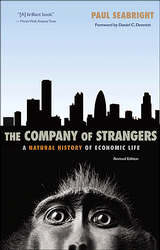 Paul Seabright, The Company of Strangers: A Natural History of Economic Life. Second Edition, Princeton University Press, 2010.
Paul Seabright, The Company of Strangers: A Natural History of Economic Life. Second Edition, Princeton University Press, 2010.
The Company of Strangers shows us the remarkable strangeness, and fragility, of our everyday lives. This completely revised and updated edition includes a new chapter analyzing how the rise and fall of social trust explain the unsustainable boom in the global economy over the past decade and the financial crisis that succeeded it.
Drawing on insights from biology, anthropology, history, psychology, and literature, Paul Seabright explores how our evolved ability of abstract reasoning has allowed institutions like money, markets, cities, and the banking system to provide the foundations of social trust that we need in our everyday lives. Even the simple acts of buying food and clothing depend on an astonishing web of interaction that spans the globe. How did humans develop the ability to trust total strangers with providing our most basic needs?
Shortlisted for the British Academy Book Prize 2005.
Visit the book’s homepage at Princeton University Press.
The book was recently the subject of a symposium in the journal Biological Theory, see SpringerLink for my contribution OR [Download PDF of proof copy] [ Download PDF of related article by Sterelny ]
It was also featured in July 2012 in an article in the Project-M magazine from Allianz Asset Management AG. The article is here, and the rest of the magazine here.
From the Reviews:
“A brilliant book.”–Martin Wolf, Financial Times
“The Company of Strangers is a model of how different disciplines can enrich each other to explain human progress.”–George Peden, Times Literary Supplement
“[A] clear, thought-provoking, and elegant book.”–Howard Davies, Times Higher Education
“Why is everyday life so strange? Because, explains Mr. Seabright, it is so much at odds with what would have seemed, as recently as 10,000 years ago, our evolutionary destiny.”–Economist
“An important and timely book. . . . It starts in the mists of prehistory but ends emphatically in the here and now.”–Giles Whittell, Times (London)
“A welcome and important contribution. . . . The Company of Strangers exemplifies a new breed of economic analysis, seeking answers to fundamental questions wherever they are found and ignoring disciplinary boundaries. . . . [It] is highly readable and will be accessible to a wide audience.”–Herbert Gintis, Nature
“There seems to be no place where Seabright is a stranger. He obviously feels as much at home among classical economists as among evolutionary biologists, quotes modern literature and ancient history with equal aplomb, jumps from experimental psychology to political philosophy and draws liberally on his personal memories of places from Ukraine to India. . . . [His] book is obviously not meant as an exercise in planned economy, but as an excursion, without blinkers and without apprehension, through a tumultuous crowd of ideas.”–Karl Sigmund, American Scientist
Translation rights: Held by Princeton University Press. For all enquiries please contact kwilliams@pupress.co.uk

